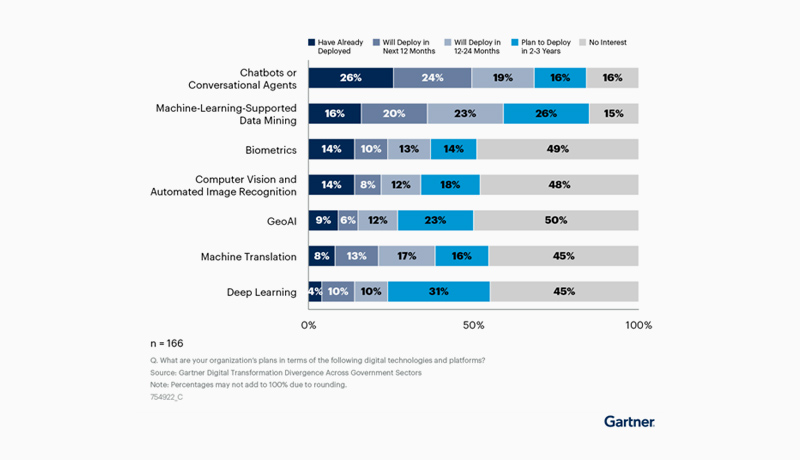
Gartner finds government organizations adopt AI, but their employees remain nervous. According to Gartner, Inc., governments throughout the world are adopting artificial intelligence (AI) technologies to support them in achieving their public purpose or mission but government employees are still concerned about the technology’s influence.
In the Gartner CIO poll for 2021, 36% of government respondents said they planned to boost investment in AI/machine learning in 2021.
Chatbots, also known as conversational agents, are leading the way in government AI adoption, with 26% of respondents saying they have already implemented them. According to the Gartner Digital Transformation Divergence Across Government Sectors survey, another 59 percent expect to adopt them during the next three years.
However, according to a separate Gartner survey, AI technologies are still viewed with scepticism, particularly among government employees who have not dealt with AI-based solutions. In comparison to 34% of employees who have not utilised AI, more over half (53%) of government employees who have worked with AI believe it provides insights to help them do their jobs better.
“Automation, insight and intelligence are all interconnected priorities for government leaders,” said Dean Lacheca, senior research director at Gartner.
He further said, “But the operational and services delivery workforce are absolutely critical to the success of any attempts to automate or augment their ways of working. Leaders can generate more acceptance by clearly linking the technology to practical outcomes that benefit government employees and support mission objectives.”
While chatbots and conversational agents are currently the most extensively used AI technologies, machine-learning-supported data mining is the most important AI technology for governments in terms of anticipated adoption. Sixteen percent have already done so, with another 69 percent planning to do so within the next three years.
Figure 1: Types of AI Adoption Across Government

Source: Gartner (October 2021)
Government agencies seek to deploy more specialised AI solutions, such as geospatial AI (GeoAI), which uses AI methods to develop knowledge through the study of spatial data and imagery, in addition to the two major AI technologies. The fact that it is more relevant to sub-sectors of government such as defence and intelligence, transportation, and municipal government explains the lesser uptake.
According to the report, 42% of government employees who have not worked with AI solutions realise that it is a tool for getting things done. However, only 27% of these same respondents believe AI has the capacity to replace numerous tasks, and only 17% believe AI has the potential to replace skilled tasks. Employees that have worked with AI technologies have a better perception of the company.
When compared to those who have not worked with AI, a higher percentage of those who have (31%) believe it poses a threat to their jobs. However, 44% of those who have used AI say it helps them make better decisions. Thirty-one percent believe AI lowers the danger of making a mistake, but 11 percent believe it makes more mistakes than humans.
“Senior executives in the public sector must address the early apprehension among the government workforce by showing how the technology helps them to getting their work done. Then continue to build confidence in the technology through exposure, use cases and case studies,” Lacheca said.
Gartner clients can learn more in the reports “Survey Analysis: Government Workforce Remain Apprehensive About AI and Automation” and “Government Insight: Align Artificial Intelligence Product Roadmap to Meet Changing Priorities.”
